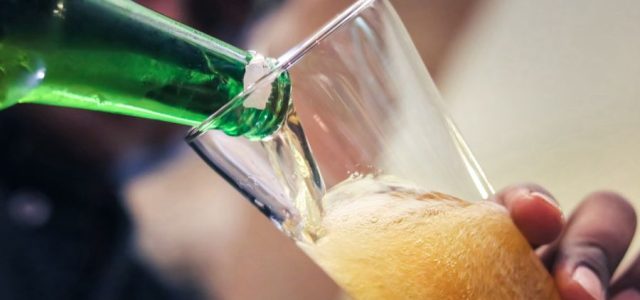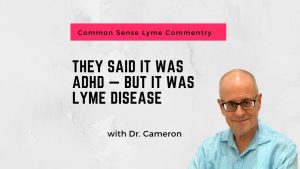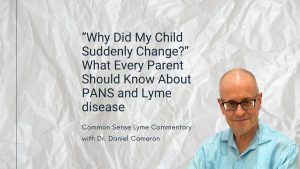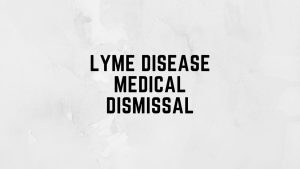
After 37 years treating Lyme disease, most patients and providers don’t realize that alcohol can make Lyme disease symptoms worse.
Even light drinking can trigger brain fog, fatigue, heart palpitations, poor sleep, or sudden emotional shifts. If your symptoms return after “just one drink,” you’re not imagining it.
This isn’t a judgment. It’s physiology. Lyme disrupts brain and immune function. Alcohol adds fuel to that fire—making it a critical consideration in Lyme disease recovery.
How Does Alcohol Worsen Lyme Symptoms?
Lyme disease isn’t limited to your joints or nerves—it can disrupt your whole system, including the brain, immune system, and the body’s automatic functions.
That’s why alcohol often makes symptoms worse. For a body already sensitized by Lyme, this reaction isn’t unusual—it’s expected.
Typical reactions include:
- Brain fog the next morning
- Unrestful sleep
- Worsened fatigue
- Heightened irritability or anxiety
- Rapid heartbeat or flushing
- Headache or muscle tightness
Alcohol interferes with sleep, immune balance, and neuro recovery—all areas already impaired in Lyme disease.
Alcohol-Induced Symptoms Appear Hours Later
Many people don’t realize alcohol is making their Lyme symptoms flare because the reaction can be delayed.
A drink at dinner can create flares the next morning or even later that night.
Even low-level drinking may:
- Disrupt REM sleep cycles
- Amplify systemic inflammation
- Exacerbate neurologic sensitivity
- Cloud your ability to assess treatment effects
Patients often assume their worsening symptoms are due to stress, relapse, or overexertion—when in fact, alcohol is silently setting them back.
No Alcohol While Healing From Lyme: A Reasoned Clinical Approach
The goal is no alcohol—at least during active recovery.
That doesn’t mean forever. But when your system is still inflamed, disrupted, or dysregulated, removing alcohol can provide:
- More stable energy
- Better sleep
- Fewer emotional crashes
- A clearer baseline
- A more predictable response to treatment
If symptoms reappear after reintroducing alcohol, that’s valuable data. And your choice becomes informed—not accidental.
Assessing Alcohol-Related Flares
Many Lyme patients are only told to avoid alcohol while on medications like doxycycline or metronidazole. But the effects of alcohol go far beyond drug interactions.
Here’s what I ask my patients:
- Do your symptoms worsen the day after drinking—even one glass?
- Is your sleep quality worse after alcohol?
- Have you considered a 2–3 week alcohol-free trial to check for patterns?
These simple questions often lead to major insights and lasting improvement.
Alcohol and Flares: What To Do
If you’re recovering from Lyme disease, and alcohol may be playing a role in symptom flares:
- Pause alcohol use for 2–3 weeks
- Track how you feel the day after drinking
- Try alcohol-free alternatives (sparkling water, teas)
- Be gentle with yourself—awareness is progress
- Reintroduce slowly only when your baseline is stable
Clinical Takeaway
After 37 years treating Lyme disease, alcohol can make symptoms worse—even one drink can trigger brain fog, fatigue, palpitations, and poor sleep. Reactions are often delayed, appearing hours later and disrupting REM sleep, amplifying inflammation, and clouding treatment assessment. During active recovery, removing alcohol provides more stable energy, better sleep, fewer emotional crashes, and a clearer baseline for evaluating treatment response.
Frequently Asked Questions
Does alcohol make Lyme disease symptoms worse?
Yes. Even one drink can trigger brain fog, fatigue, palpitations, poor sleep, anxiety, and headaches—often appearing hours after drinking.
Why does alcohol worsen Lyme symptoms?
Alcohol disrupts REM sleep, amplifies systemic inflammation, exacerbates neurologic sensitivity, and interferes with immune balance—all already impaired in Lyme disease.
Should I avoid alcohol while recovering from Lyme disease?
Yes, at least during active recovery. Removing alcohol can provide more stable energy, better sleep, fewer crashes, and a clearer baseline for treatment response.
Related Reading
Lyme Disease Recovery: What Patients Need to Know
Alcohol and Lyme Disease: When One Drink Hurts
Lyme Alcohol Intolerance: Why Can’t I Tolerate Alcohol Anymore?
What Does a Lyme Flare-Up Feel Like?
References
-
- Centers for Disease Control and Prevention. Lyme Disease Treatment.
- Dr. Daniel Cameron: Lyme Science Blog. Alcohol and Lyme Disease: When One Drink Hurts.
- Dr. Daniel Cameron: Lyme Science Blog. What does a Lyme flare-up feel like?



Why arent providers held accountable? They are required to answer questions when they are certifying to become doctors but when they are doctors they are allowed to refuse treatment for Lymes Disease. My husband was mistreated and died becauae doctors would not treat his Lymes.
I was shocked to learn that alcohol will make Lyme Disease Symptoms worse. I have been struggling with Lyme for years now and I am amazed ( & pleasantly surprised) by the new information I find on your site. I wish there were more Lyme Literate Drs in Connecticut.